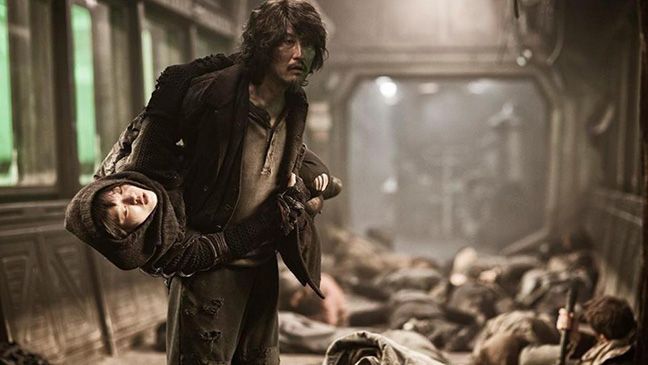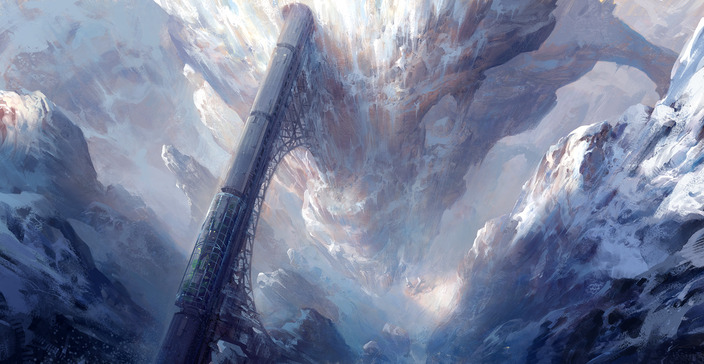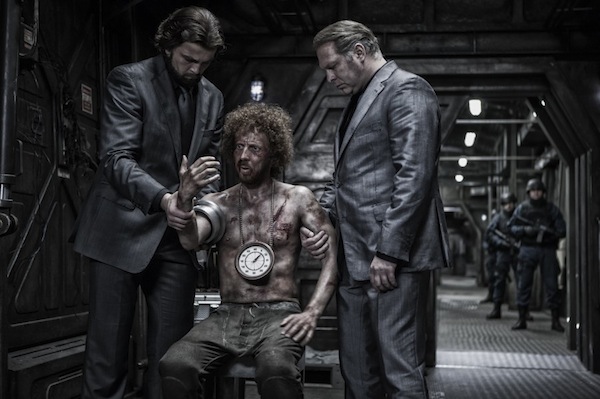 Two decades into a second Ice Age, a few thousand human survivors live out their days aboard a state-of-the-art luxury train in “Snowpiercer,” an enormously ambitious, visually stunning and richly satisfying futuristic epic from the gifted Korean genre director Bong Joon-ho (“The Host,” “Memories of Murder”).
Two decades into a second Ice Age, a few thousand human survivors live out their days aboard a state-of-the-art luxury train in “Snowpiercer,” an enormously ambitious, visually stunning and richly satisfying futuristic epic from the gifted Korean genre director Bong Joon-ho (“The Host,” “Memories of Murder”).A rare high-end sci-fi/fantasy pic made completely outside the studio system, and that even rarer case of an acclaimed foreign helmer working in English with no appreciable loss of his distinctive visual and storytelling style, Bong’s adaptation of French graphic novel “Le Transperceneige” reps a pricey investment ($40 million) for majority producer CJ Entertainment, but seems a downright bargain
compared with the cost of forging such pics on Hollywood turf.
Adapted by Bong and Kelly Masterson (“Before the Devil Knows You’re Dead”) from the 1982 graphic novel by authors Jacques Lob, Benjamin Legrand and Jean-Marc Rochette, “Snowpiercer” has been brought to the screen with the kind of solid narrative craftsmanship, carefully drawn characters and—above all—respect for the audience’s intelligence rarely encountered in high-concept genre cinema except when directors like James Cameron, Christopher Nolan and Guillermo del Toro are at the helm.
Indeed, Bong’s film owes something to “Titanic” in its vision of a crowded passenger vessel that functions as an elaborate microcosm of society itself, complete with all the same top-down class distinctions, only here rendered tip to tail. Oh, and ice presents no obstacle for the Snowpiercer; it smashes right through great, arctic blocks of the stuff as it circumnavigates our now-frozen planet on a high-altitude railway.
The train and the track are both the inventions of Wilford, a billionaire industrialist dismissed as a crank in his day but now having the last laugh, his unseen, Oz-like presence looming large over the denizens of the Snowpiercer and inspiring a fanatical degree of devotion in his fascistic minions (led by Tilda Swinton’s hilariously grotesque Mason, with pudding-thick Yorkshire accent and upper bridge work that speaks especially ill of British dental care). We begin in the caboose, where the great, soot-faced, Dickensian masses jostle for space and rumors of incipient class revolt stir the air. It isn’t the first time the have-nots have attempted to take control of the train, but previous efforts failed because no one managed to make it all the way to the engine room. This time, things will be different, promises Curtis (Chris Evans), the revolution’s semi-reluctant instigator, though it’s clear to see he has the makings of a sturdy prole hero.
For a while, cryptic messages have been arriving concealed in the gelatinous protein bars that serve as the stomach-churning staple of the “back of the train” diet, convincing Curtis and his wise, disabled mentor, Gilliam (John Hurt), that someone at the front of the train is spurring them on. One such message encourages them to free a Korean security expert, Namgoong Minsu (Song Kang-ho), from custody in the train’s prison car. But Minsu, wonderfully and inventively played by Song as an ornery, bedraggled self-preservationist, drives a hard bargain. He agrees to help only if his imprisoned daughter (Ko Asung, who also played Song’s plucky daughter in “The Host”) can tag along–and if each of them is rewarded with a fix of the hallucinogenic drug kronole for every door they manage to open.
(The character, who speaks only in Korean, is able to communicate with the others via a two-way, voice-activated translation machine.)
Thus, armed with a few homemade weapons, Curtis and his band of ragtag revolutionaries (including Jamie Bell as Curtis’ loyal adjutant and Octavia Spencer as a mother searching for her missing child) begin their journey forward. At which point “Snowpiercer” sheds the close-quarters claustrophobia of the first half (which nods to such classic cinematic railway fare as “The Narrow Margin” and “Runaway Train”) in favor of a more expansive vision.
Built on gimbals on a series of interconnected soundstages at Prague’s Barrandov Studios, the train itself is a triumph of visual imagination for Bong and production designer Ondrej Nekvasil (“The Illusionist”), with each successive car revealing a new, surprising facet of this eerie, self-sustaining ecosystem: one a lush greenhouse, another a giant aquarium, yet another a Disney-on-acid classroom presided over by a creepily cheerful schoolmarm (Alison Pill). Gradually, color and light enter the heretofore monochrome frames, along with our first real glimpses of the outside world and its infinite permafrost. The further forward the rebels travel, the more decadent the surroundings get, until we arrive at the very front of the train and its blithe one-percenters, who seem to have been deposited direct from New Year’s Eve at the Overlook Hotel (a connection made explicit by Al Bowlly singing “Midnight the Stars and You” on pic’s soundtrack).
Along the way, various impediments arrive, mostly in the form of Wilford’s sizable personal militia, whose first major standoff with Curtis and company is a brilliantly staged rumble that coincides with the train’s passage through an extended tunnel, shrouding the combatants in near-total darkness. Like most of the key actions scenes, it’s executed in moodier, more impressionistic fashion than the whiplash-inducing likes of “Man of Steel” and “The Avengers.” Making a particularly menacing impression as one of Wilford and Mason’s head henchmen, without ever uttering a single word of dialogue, is Romanian thesp Vlad Ivanov (best known for playing the abortionist Mr. Bebe in “4 Months, 3 Weeks and 2 Days”).
Throughout, Bong gets away with much that he almost surely would have had to curtail if working at an American studio. For starters, the pic’s pacing is more measured than most of its type, but never slack, with lots of time taken out for nuanced, character-building scenes that increase our level of emotional involvement. Important backstories are deployed only gradually, constantly shifting our sense of who the characters are and what motivates them. (As in “The Host,” too, all bets are off on who dies and who gets to live.) By the end, the film reveals itself as a surprisingly thoughtful contemplation of man’s inhumanity to his fellow man, and whether mankind is worth trying to save at all. Somber stuff, to be sure, but not without flashes of hope, and a steady infusion of Bong’s dark, quirky humor. — Variety



